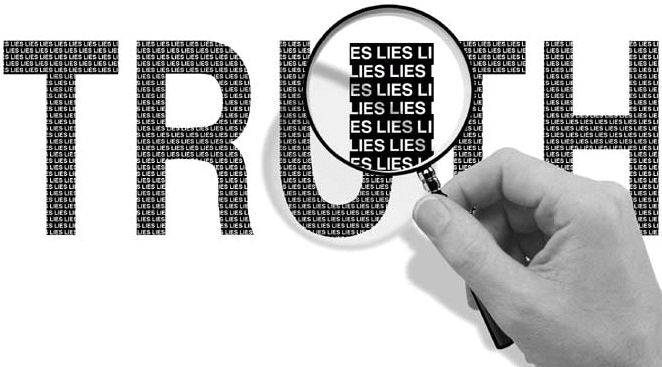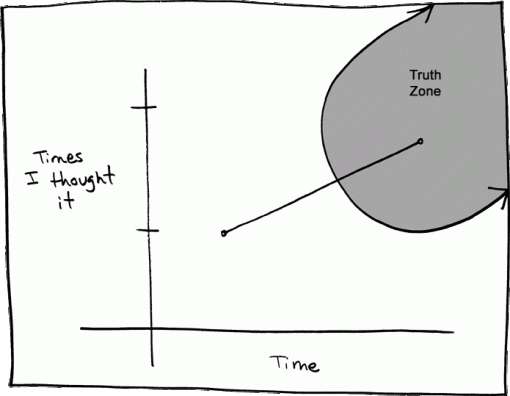Do Psychedelics Encourage False Belief?
During a psychedelic experience, it’s common to have many new ideas. Are they always good ideas? Trippers generally think so, and many of them may well be. To people who don’t trip, however, the idea that a drug could be a font of pure wisdom is totally ludicrous. This article approaches the issue partially from the perspective of social psychology and cognitive biases (much of what I explain here comes from a paper by Daniel Gilbert, which I highly recommend). Could tripping cause us to believe things we would otherwise — even ought to — reject?
To begin with, there’s the notion that comprehension entails belief. In the words of William James, “all propositions, whether attributive or existential, are believed through the very act of being conceived.” This may sound strange, but there’s actually a lot of evidence for it, and if it weren’t the case it’d be very difficult to get around and do things. Another way of thinking about this is that it takes more effort to doubt something than it does to accept it: first we represent an idea, and only later can we reject it.
Compare two hypothetical mental systems. In one, truth and falseness are assumed to be equally likely, and so everything needs to be evaluated carefully to determine its veracity. In the other, truth is assumed to be far more likely, and everything will by default be accepted as true, unless a compelling argument against it becomes obvious. Look around your room and see which of the two you’re using: all the objects you see, are they approximately, functionally, what they appear to be? Do you need to carefully test each bit of floor to ensure that you won’t fall to your doom through what’s merely an illusion in the shape of floor?
We constantly process large volumes of information, nearly all of which is accurate enough to trust. There are lies and illusions, yes, but they’re relatively rare, so it actually makes sense to be fairly credulous most of the time. And, as it turns out, we are. Our primary way of sorting information is to ignore the vast majority and accept the rest, disregarding whatever isn’t commensurable with our extant mental frameworks. If what you’re seeing doesn’t make sense, it’s probably an illusion. If it does make sense, it’s probably accurate enough to treat it as “real.” This is useful and important, but it means that determining whether information is “correct” or not isn’t even something we’re trying to do most of the time, let alone something we succeed at reliably. We don’t need to: pattern recognition alone is sufficient to effectively navigate and make decisions. This has important implications for drugs which boost pattern recognition: more things can be understood, and therefore more things will be believed.

Another important ramification of the primacy of truth is that the more overloaded we are, the more likely we are to accept things without question. Because accepting an idea happens before we have a chance to reject it (upon remembering some bit of information that contradicts it, or upon applying it to something and seeing that its consequences are absurd, for example), our ability to evaluate something for accuracy depends upon having the time and resources to do so. The fewer available resources, the more we’ll accept things as true.
An example of something that might take away some of those cognitive resources, of course, is other salient information. Why think long and hard about one question, when there are other, really exciting things to pay attention to? For those not familiar, “salience” is the technical term for the property of “standing out,” being interesting or notable. Increasing salience is also one of the main effects of psychedelics: things that you didn’t notice before become interesting, and things that were already interesting become larger than life. This is, of course, one of the major benefits of psychedelics for insight formation, because they get you to look at things in new ways, paying attention to that which you might otherwise have ignored. In some situations this may be a two-edged sword: simple illusions may be easier to spot (nothing can hide in plain sight), but the sheer volume of information you’re processing can make parsing concepts like “absolute truth” difficult, while crowding out your ability to reflect or carefully consider, increasing the proportion of ideas you’ll believe.
It’s worth remembering that LSD has been explored for its potential as a brainwashing agent, with dismal results. As it turns out, if government agents give you acid and try to convince you of things, their success rate is going to be very low. During my series of interviews last year, I asked each respondent whether they had ever had a “false epiphany” while tripping, and the results were nearly* unanimous: no. Interestingly, it’s far more common for people to come up and realise that their sober ideas were wrong than the other way around. This is especially true for mystical or metaphysical notions, as it’s very common for such matters to be concretely experienced when tripping, when they were merely hypothetical and abstract when sober. Thus, the puerility of what once made sense becomes obvious. They also tend to make us more sensitive to underlying motivations, so it may be very obvious if somebody is trying to trick us into something.
That said, psychedelics have been famously used by a variety of religious or “cult” leaders to indoctrinate new members. If psychedelics make it easier to spot bullshit, and if the CIA was unable to use them as brainwashing agents, how could this be? One explanation is that the religious leaders weren’t actually tricking the people into believing false things, or even transmitting information, but merely presenting generalities which could then be filled in with legitimate insights by each. Effective indoctrination into a religious or magical group does not require uniformity of beliefs, but merely a sense by the inductee that the leader has access to spiritual truth. This is especially the case in a situation where the inductee formerly had little interest in or exposure to mystical understandings. Through having their first ever personal realisations of spiritual truth in the context of taking psychedelics with somebody, it becomes easy to associate truth with that person. Once the appetite for spiritual insight has been whet, pursuing group membership in the hopes of further insights becomes a distinct possibility, all without having had any “false epiphanies” or delusions.

Getting back to the point I introduced above — that comprehension entails belief — psychedelics make it easier to conceive of new ideas by lowering the filters on our perception and supercharging our gestalt pattern matching facility. They also jack up the salience of everything, including those ideas, so they will not only be understood (and therefore automatically accepted), but also experienced as very important. They also tend to occasion not just one idea, but many, many ideas in a very short period, so remaining focused on any particular one for long enough to fully evaluate it may be unlikely. That means it’s extremely likely for the ideas we have while tripping to be accepted as true, especially if they have a spiritual feel to them and we’ve been primed to expect mystical truths. Especially during very intense trips, it’s common to come out of them dumbstruck, feeling that all the secrets of the universe had been revealed (not just the one secret of everything, but thousands of distinct truths), but being unable to remember all but the vaguest of generalities.
The experience of my respondents does not suggest that asinine or false ideas are likely to be accepted because of a trip. One particularly interesting comparison is often made between the “hit rates” of ideas occasioned between cannabis and classic psychedelics: on cannabis, people often have many ideas, a few of which are great but many of which just sound stupid after sobering up. On mushrooms or acid, however, the ideas didn’t just seem good at the time but actually were considered to have lasting value. This often surprises regular pot-smokers when they first take a classic psychedelic: they’re used to having epiphanies, but not ones which actually still hold water the next day and the next week. Further research is necessary to adequately explain this difference and to determine its extent. Your mileage may vary.
If you want to have a trip geared toward the generation and honing of insights (as opposed to Mystical union, or experience of Communion and interconnection), here are some guidelines which take into account the above discussion:
- Be somewhere not too distracting or overwhelming. Raves and the like can work for a Communion experience, but Insight requires time, quiet and privacy to think things over.
- Give yourself lots of extra time after your expected comedown before you need to be anywhere, so you can reflect while sober.
- Audio record your session, and/or take notes! Make sure to get permission if anyone else appears on the recording. Listening to a recording of your conversation afterword can be extremely useful.
- Take a small or moderate dose of something with a medium duration. Short, strong trips are great for Entheogenesis or Mysticism, but could be an information overload, and past a certain duration or intensity there may be diminishing returns.
- Don’t expect to remember or keep everything, or for everything to make sense. If you get one or two interesting ideas out of a trip, great! Stressing over completion will just get in the way
“Though Truth and Falsehood bee neare twins, yet Truth a little elder is” – John Dunne
* A rare example of a “false epiphany” comes from Heru (a cultural engineer). For approximately one year, he believed himself to be Christ. “I believe that everything that we’re shown is in some sense true, in that it relates to the nature of our mind. But in my experience I found myself falling into quite delusional states, because I was attempting to project these truths into another level of experience. … We generally seem to exist on a relative level where there is a dualism between subject and object. … And if we experience a non-dual state like ‘I am the Christos’ or ‘I am Buddha-nature,’ … when we go back to the relative world … it appears to us that ‘I am the One, but no-one else is.’ So we objectify and reify the idea. And in that sense it can lead to Messianic complexes, which I went through… and yes, technically, we can save the world. We are here to do that. But it’s very easy for the ego to take that and twist it around and simply use it as another thing to propagate its own belief in its own independent existence.”


